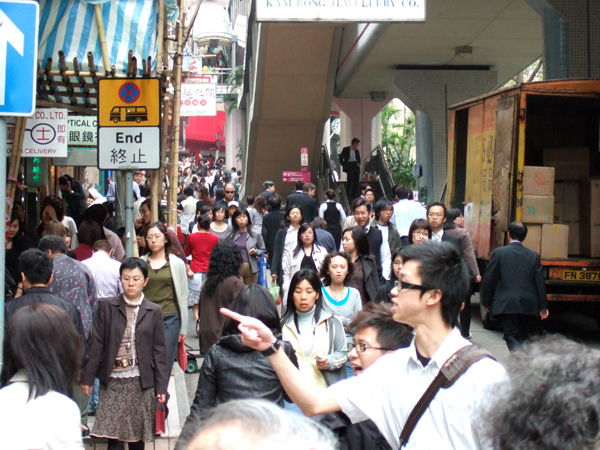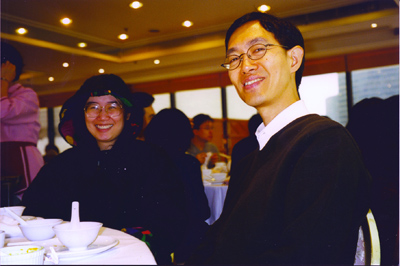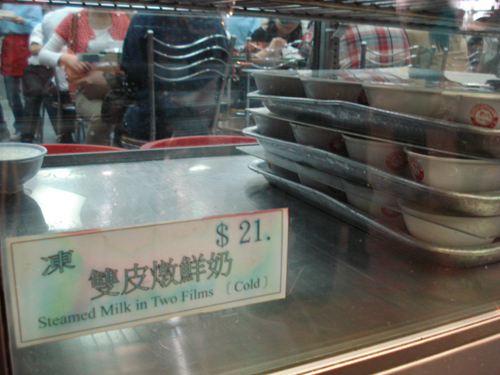PLANET HONG KONG: One more visit
Tuesday | January 18, 2011 open printable version
open printable version
Hong Kong, Central, April 2008.
DB here:
Planet Hong Kong, in a second edition, is now available as a pdf file. It can be ordered on this page, which gives more information about the new version and reprints the 2000 Preface. I take this opportunity to thank Meg Hamel, who edited and designed the book and put it online.
As a sort of celebration, for a short while I’ll run daily entries about Hong Kong cinema. These go beyond the book in dealing with things I didn’t have time or inclination to raise in the text. The first one, listing around 25 HK classics, is here. The second, a quick overview of the decline of the industry, is here. The third discusses principles of HK action cinema here. A fourth, a portfolio of photos of Hong Kong stars, is here. That was followed by a tribute to western Hong Kong fans and then by a photo gallery of directors. Today’s installment is the last. Thanks to Kristin for stepping aside and postponing her entry on 3D, which will appear later this week.
Since the 1980s, the film festival circuit has become the only distribution system to rival Hollywood’s global reach. A big-name festival publicizes a film, some high-end critics at the festival write reviews, then once the film opens in a region or country, critics at large review it. As smaller festivals pick up films from the bigger ones, until eventually films make their way to small cities around the world. This process is parallel to the one that the studios orchestrate, though they have more centralized control. Video distribution, the circulation of DVD screeners, and Internet reviewing complicate this picture, but I don’t think they change the essential role of the festival network.
Just as film scholars have started to pay attention to fandom (see this post), they’ve started to ask research questions about festivals. As very few films from overseas find their way to U. S. screens, scholars keen on current cinema have realized that they need to visit festivals. It’s like scholars of painting traveling to exhibitions and gallery shows, or opera aficionados attending premieres at Bayreuth and La Scala. And film scholars of certain genres or periods have realized that they can do on-the-fly research by visiting historically oriented festivals like Pordenone and Bologna.
These days I see more of my colleagues at various festivals. In particular there’s the peripatetic Bérénice Reynaud, an early example of the multitasker (critic, programmer, professor, fan). On the same circuit I meet Virginia Wright Wexman, Peter Rist, Mike Walsh, Jim Udden, Gary Bettinson, and many other profs. So I’m starting to think that festivals are giving academic film studies a fresh charge of energy. Reciprocally, the events at Pordenone and Bologna, which began as cinephile events, have invited academic researchers to help program them and write for their publications. In sum, festivals are now a vigorous workspace for not just screenings and critical write-ups but discussions about ideas that would normally haunt the groves (or is it grooves?) of academe.
Saturation booking
Athena Tsui and Li Cheuk-to. Hong Kong, 2000.
I had dropped in at screenings at the New York and London film festivals in the 1970s and 1980s, and I had steadily attended the summer Cinédécouvertes series in Brussels. But I had never “done” a festival intensively until I went to Hong Kong in the spring of 1995. There I saw films that still stay with me: Through the Olive Trees, Postman, In the Heat of the Sun, A Borrowed Life, Smoking/ No Smoking, Quiet Days of the Firemen, Taebek Mountains, 71 Fragments of a Chronology of Chance, Whispering Pages, and Clean, Shaven. (My one big miss was Sátántangó; I had to wait years to catch up with that.) Who says the 1990s were a meager decade? Can any festival today come up with a menu like this?
I had gone, as I explain in the Preface to Planet Hong Kong, mainly to check on local cinema. The “Hong Kong Panorama” surveying 1994 releases yielded a bumper crop, including some titles I’d seen only on laserdisc (Chungking Express, Ashes of Time) and others that were revelations. Above all, there was a retrospective—an entire festival in itself, really—dedicated to early Chinese and Hong Kong cinema. They swept over me in a heaving wave: Love and Duty (1932), The Eight Hundred Heroes (1938), Boundless Future (1941), and many others, along with postwar Hong Kong classics like Where Is My Darling? (1947), Song of a Songstress (1948), The Kid (1950), with Bruce Lee, and on and on. The series was capped by stunning restored Technicolor prints of The Orphan (1960), also with Bruce, and General Kwan Seduced by Due Sim under Moonlight (1956). Some of these had circulated on poor VHS copies, but most were, and still are, unknown in the West.
I had picked the perfect year to come to the festival. Looking back at the notes I scribbled in the dark, I realize that over three weeks I got a crash course in Chinese film history. In any given day I was given more to think about, and certainly more to feel about, than I got from almost any academic conference.
For those of us interested in non-Hollywood cinema, festival programmers and critics are central gatekeepers. They scout the ridge and scan the horizon, and around the campfire they teach us film lore. They’ve built up fingertip knowledge about movies, moviemakers, distribution patterns, sales agents, theatre circuits—in sum, the workings of world film culture. The best of these gatekeepers are intellectuals, ready to search out something stimulating in even the most marginal film. They have honed their senses to detect qualities that could provoke an audience or yield a lively Q & A or a piquant catalogue entry or a solid review. Out of pure selfishness, I wish I could download the neural storage files of Alissa Simon, Richard Peña, Tony Rayns, Cameron Bailey, and their peers. Alas, there is no app for that.
In Hong Kong I met Li Cheuk-to, Jacob Wong, Freddie Wong, and many other programmers, along with Athena Tsui and Shu Kei. What made my experience that spring of 1995 so thrilling were their months of patient planning and sleepless nights behind the scenes—finding the prints, arranging for them, writing catalogue copy and, not least, assembling a massive reference work like Early Images of Hong Kong & China, one of the precious books the festival managed to turn out every year to document the local cinema.
Many programmers are also critics, and such was the case in Hong Kong. When I arrived, Cheuk-to and his colleagues had just formed the Hong Kong Film Critics Society, and I was invited to their first awards ceremony. They were mostly young, and after the awards were handed out I was invited out to dinner with several of them. It was then I realized that here was a local film culture in which criticism mattered. Hong Kong was small enough for critics to band together to debate their cinema. Soon another critics’ group was founded, and the debates spread. I started to understand that if one were to study a film culture, one would have to grasp the dynamics of taste among schools of critics and between critics and their audiences. I made an effort to describe this dynamic in the second chapter of Planet Hong Kong.
It’s not just that that book had its origins in that first visit. And it’s not just that the newest edition is the result of my attending the festival for the last fifteen years. More important, my ideas about film and about the world changed when I met critics, programmers, and other academics in Hong Kong. Immersion in one of the world’s most fascinating cities had something to do with it too.
Favorites, for now
As Tears Go By (1988).
In my first entry in this hurriedly posted series, I listed around 25 Hong Kong films that most aficionados consider of major importance—historical, artistic, cultural, or all three. In the days since, I’ve mentioned several other films that you can check into. Here, as an envoi to this yakathon, are a few more movies that I’ve repeatedly enjoyed, and that I’ve sometimes talked about in PHK 2. They’re grouped in very loose categories.
Lesser-known items from major directors. Once a Thief is a good example. Sandwiched between Woo’s official classics is this good-natured, somewhat silly action comedy about art thieves, romance, and parenthood. Lifeline is one of my favorite Johnnie To Kei-fung films—not as formally audacious as his later masterpieces, but containing one of cinema’s great action sequences involving a fire that seems as unstoppable as a waterfall, with the bonus of a throat-catching epilogue. Ann Hui On-wah’s Summer Snow, about a busy career woman who must treat her Alzheimer’s-affected father, glows with the intimate realism and understated sentiment that inform her more recent The Way We Are.
Everybody knows some works by Wong Kar-wai, but I think his later accomplishments have overshadowed his debut, As Tears Go By, a prototype of the arty gangster movie. Drenched in romanticism, it has one of the great music montages in Hong Kong film and a finale that you feel lifting from genre formula to pictorial poetry. With Johnnie To as well, even offbeat items like Throw Down are getting well-known, but I’d like to make a pitch for the New Year’s mahjong comedy Fat Choi Spirit. It has some of the 1980s nuttiness; the laughs start at the DVD menu.
Tsui Hark has produced so many films that have been fan favorites–Peking Opera Blues, Once Upon a Time in China, and Swordsman III: The East Is Red–that you can’t expect anything worthy to be overlooked. And yet not enough people have seen the bouncy Shanghai Blues, with moments of musical rapture, and The Chinese Feast, with all his faults and virtues bundled into a celebration of cooking and eating. There’s also The Blade, a convulsive revenge saga that seems to me one of the best movies made anywhere in the 1990s. After it’s over, you’re not sure what hit you.
Drama, comedy, dramedy. Any reader of PHK knows my fondness for the gender-bending romance Peter Chan Ho-sun’s He’s a Woman, She’s a Man, a lovely integration of musical, coming-of-age story, and satire of sex roles. But my favorite Michael Hui film, Chicken and Duck Talk didn’t feature in the first edition because I couldn’t get my hands on a print to illustrate it. Tracing the rivalry between a scruffy duck restaurant and a Japanese knockoff of Colonel Sanders, it yields many hilarious sequences, perhaps most notably Hui’s efforts to conceal a plague of rats from health inspectors.
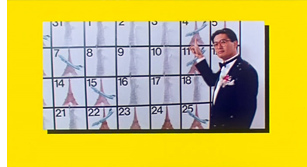 Chow Yun-fat made his western reputation in crime movies, but his local fans also love his comedies and dramas. Try the screwball Diary of a Big Man (right) in which Chow juggles two wives and enacts a music video; the wistful romantic drama An Autumn Tale; and of course the male melodrama All About Ah Long. Churning out six to nine movies a year, the man was a real movie star. In April 1995, I was waiting in line to see Peace Hotel and felt the crowd’s nervous anticipation. Three whole months had passed since they’d seen their friend in a new movie.
Chow Yun-fat made his western reputation in crime movies, but his local fans also love his comedies and dramas. Try the screwball Diary of a Big Man (right) in which Chow juggles two wives and enacts a music video; the wistful romantic drama An Autumn Tale; and of course the male melodrama All About Ah Long. Churning out six to nine movies a year, the man was a real movie star. In April 1995, I was waiting in line to see Peace Hotel and felt the crowd’s nervous anticipation. Three whole months had passed since they’d seen their friend in a new movie.
My associates sigh when I mention Wong Jing. What can I say? I find some of his films funny. Try Boys Are Easy, Tricky Master, and, probably my favorite, Whatever You Want. If you don’t like them, write my suggestion off as David in his Dotage. Speaking of silliness, I’m not over-fond of Stephen Chow, but All for the Winner, Flirting Scholar, From Beijing with Love, and A Chinese Odyssey are ingratiating enough. Square that I am, I like Shaolin Soccer too.
I’d add the medical melodrama C’est la Vie, Mon Cherie, the unpredictable cop stakeout movie Bullets over Summer, and the poignant Juliet in Love, about a triad’s attraction to a woman recovering from a mastectomy. Sylvia Chang Ai-chia’s quiet romantic dramas Tempting Heart and 20 30 40 are also rewarding. Patrick Tam Kar-ming’s films are still unjustly neglected, so anything might be considered obscure, but I was delighted when a passable DVD of My Heart Is that Eternal Rose was released. Here Tam lyricized the gangster movie; Wong Kar-wai took the next step.
For grotesque comedy, try You Shoot I Shoot, about a contract killer who adds value by having an aspiring director film the hits (complete with slo-mo) for the delectation of the client. Unclassifiable is The Inspector Wears Skirts II, a cop-training story that pits women recruits against dimwitted men. It includes a dance sequence displaying minimal skill and maximal cheerfulness.
Fight club: Of Chang Cheh’s vast output of martial-arts movies, I have a special affection for New One-Armed Swordsman, a spectacularly mounted action picture, and Crippled Avengers, in which “disabled” really does mean “differently abled.” For Lau Kar-leung, I especially admire Legendary Weapons of China, one of the strangest of his forays into the arcana of martial arts lore and Chinese history; Shaolin Challenges Ninja (aka Heroes of the East), a sort of Taming of the Shrew, but with throwing stars; and the harrowing Eight-Diagram Pole Fighter, something of a valedictory for the Shaolin tradition at Shaw Brothers. Both these directors made so many worthwhile films that you can spend a lot of agreeable time exploring their output.
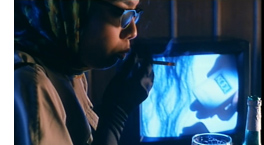 Though not everyone agrees, I think that Corey Yuen Kwai is a fine director of action pictures, from the tonally discordant Ninja in the Dragon’s Den through the warrior-women saga Yes, Madam!, the vigilante-justice Righting Wrongs (incredible, literally, final airborne sequence), and Saviour of the Soul, a futuristic fantasy with one shot looking forward to Chungking Express (right). Yuen’s Fong Sai-yuk films and Bodyguard from Beijing contain classic sequences—fighting on the heads of a crowd, on top of a precarious pile of furniture, in a hypermodern kitchen. Co-signing the first Transporter film, he turned in something resembling the classic Hong Kong style.
Though not everyone agrees, I think that Corey Yuen Kwai is a fine director of action pictures, from the tonally discordant Ninja in the Dragon’s Den through the warrior-women saga Yes, Madam!, the vigilante-justice Righting Wrongs (incredible, literally, final airborne sequence), and Saviour of the Soul, a futuristic fantasy with one shot looking forward to Chungking Express (right). Yuen’s Fong Sai-yuk films and Bodyguard from Beijing contain classic sequences—fighting on the heads of a crowd, on top of a precarious pile of furniture, in a hypermodern kitchen. Co-signing the first Transporter film, he turned in something resembling the classic Hong Kong style.
In the crime vein consider Kirk Wong’s hard-driving and pitiless Rock ‘n’ Roll Cop and Danny Lee’s Law with Two Phases (not a typo). Ringo Lam’s films are notably tougher and more tactile than those of his contemporaries; see his deromanticized classic City on Fire, the effort to out-Woo Woo that is Full Contact, and the lesser-known Full Alert. Eddie Fong Ling-Ching isn’t known for policiers, but Private Eye Blues was one of the films I enjoyed in the 1995 Panorama. His historical drama Kawashima Yoshiko is even more remarkable.
Connoisseurs know The Outlaw Brothers; one glimpse of the climax, in which a gunfight is interrupted by a hailstorm of poultry, usually convinces any viewer to take a closer look. I must add the below-the-radar ensembler Task Force, by John Woo protégé Patrick Leung Pak-kin. Gratifyingly untidy in skipping among the personal lives of a cop squad, it eventually focuses on the need to settle conflicts without violence—after, of course, supplying some snappy fight scenes of its own.
Post-handover take-outs. Most of the films I’ve mentioned are from the 1970s through the 1990s. But many worthy films have emerged in the 2000s. If they don’t always carry the effervescence of the earlier ones, many are solidly crafted. Some are discussed in Planet Hong Kong 2.0 and many more have received commentary on other websites (e.g., LoveHKFilm), so I’ll just mention a few that seem to me of more than transitory appeal.
Patrick Tam’s After This Our Exile is an unsentimental look at how an aggressive, heedless father must come to terms with his little boy. Needing You is a better-than-average office comedy, while Hooked on You is poignant in the gruff Hong Kong way, with a touching finale about the changes since 1997. Benny Chan Muk-sing’s action pictures usually deliver sturdy value in the old style. Try Connected, a remake of Cellular; New Police Story, with Jackie Chan as a cop coming to terms with age and failure in the face of nihilistic youth; and Invisible Target, which boasts an old-fashioned Hard Boiled demolition derby, with a police station ground zero this time. Horror fans already know how uneven HK films in that genre can be, but surely Fruit Chan Goh’s Dumplings is an admirably creepy achievement, and Soi Cheang Pou-soi did good work in the genre as well (Diamond Hill, Horror Hotline) before moving to the suspenseful Love Battlefield and the harsh action picture Dog Bite Dog.
Whew! After seven sword-like days, I’m running out of time, and I haven’t achieved a final victory. Want more dangerous encounters? Go to PHK or the Hong Kong Critics Society Award winnerss and start looking for your better tomorrow.
Sorry, I couldn’t resist.
Kristin and I discuss film festivals as an aspect of global film culture in Chapter 29 of Film History: An Introduction. For detailed research into the festival scene, see Richard Porton, ed., Dekalog 3: On Film Festivals and several publications from St. Andrews University. The most recent volume, edited by Dina Iordanova and Ruby Cheung, focuses on East Asian events.
P.S. Thanks to Yvonne Teh for a title correction, and Tim Youngs for a geographical one!
Photo: Joanna C. Lee, courtesy Ken Smith.












